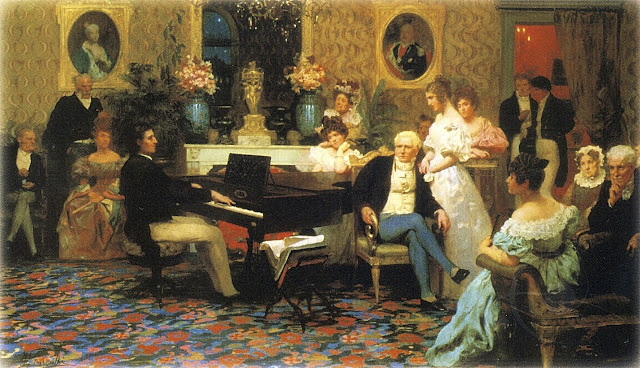Among the many CDs I have before me, occasionally one stands out prominently for the uniqueness of its subject and the spiritually as well as physically enhancing nature of the music.
Unless blessed with a vivid imagination and a feeling for Spain, one does not readily associate the music of Fryderyk Chopin and Spain. We are partly familiar with the creative yet blighted period Chopin and Sand spent at Valldemossa on Mallorca. Perhaps not the incredible destiny of the small local Spanish piano by Juan Bauza that Chopin struggled with until his Pleyel pianino arrived from Paris. That extraordinary story is covered in detail in Chopin's Piano - A Journey through Romanticism by Paul Kildea (London, Allen Lane 2018).
We also adore the modern lightness and charm his Bolero in A minor Op.19, a first indication of a Spanish touch or enthusiasm. The guitar was one of Chopin's favourite instruments, chosen by his teacher Józef Elsner to serenade with singers his departure through a Warsaw gateway, never to return.
One must also never forget the vein of exotic, even erotic orientalism that threads its scarlet path through the various decorative arts of remarkable Sarmatian Poland. Chopin's own fascination with the emotional scope of folk music is sublimated in his mazurkas with their adventurous, occasionally eastern, harmonic transitions. Some of his Nocturnes embrace us in 'the perfumes of Sarmatia' with their dream atmospheres.
In November 1838 at the villa ‘Son Vent’, near
Palma, Chopin wrote to Julian Fontata (himself influenced by Cuban music) his amanuensis:
‘I am in Palma, amidst the palms, cedars,
cactuses, oranges, lemons, aloes, figs, pomegranates, etc. What only the Jardin
des Plantes has in its ovens. The sky like turquoise, sea like azure, mountains
like emerald, air like in heaven. During the day, sunny, everyone walking as if
it were summer and hot; at night, guitars and song for hours on end. […] The
piano has not yet arrived. What route did they send it? You will soon receive
the preludes. […] And my life, I am living a little more… I am close to that
which is most beautiful. I am better’.
The legendary figure of Flamenco, Paco Peña, born in Córdoba in Andalucia, together with his ensemble in this recording, conjures up the world of exotic colours and tastes, the most beautiful shades of colour and deep emotions. An enchanted atmosphere of unique music united with dance, music that is naturally part of the culture, tradition and emotionality of the Spanish nation.
Paco Peña’s talent, virtuosity, emotionalism and invention make it an individual, not obvious, but at the same time surprisingly resonating context for the work of Chopin. I remember going to the intimate surroundings of Ronnie Scotts Jazz Club in Soho in London in the 1970s to hear the genius of Paco Peña. Such memorable nights they were ! I certainly never expected any association with Chopin in those early, garlic and olive oil, bohemian days of my early twenties.
Ah my youthful memories of my Flamenco enthusiasm flood me! I had a particularly intense passion for the rough, charismatic and 'basically instinctive' French-Romany Flamenco guitarist, Manitas de Plata ('little hands of silver'). He was considered the 'the rage of the
Riviera' whose devoted following included Bardot, Cocteau, Picasso and Dali.
He, as well as Paco Peña, possessed the indefinable ‘duende flamenco’. In Spain a shout would go up from de Plata, his company (Los Baliardos) and the assembled listeners when that mysterious emotion, a shiver along the spine, spontaneously appeared. The moment was explained by the great modern Spanish
poet Federico García Lorca “It’s not in the throat; it goes up
inside from the soles of the feet. That is to say, it is not a question of
faculty, but of true living style; that is, of blood; of very old culture, of
creation in the act. It is an inexplicable power of attraction, the
ability to send waves of emotion through those watching and listening to them." A sudden and heightened awareness of death overcomes the listener to the Flamenco singer giving rise to a harsh cry of the recognition of mortality.
Manitas de Plata was performing well into his eighties and said the two things that mattered most in his life were music and women.
This splendid album records the one and only Paco Peña concert that took place during the 2010 Chopin and His Europe Festival. It was an unforgettable evening filled with fantastic energy and marvellous music. The intriguing, inspiring album is a great experience not only for music afficionados, not only for Chopin lovers but also Flamenco enthusiasts. Apart from a Fandango and other Flamenco works, the Chopin Waltzes in A minor Op.34 No. 2 and C-sharp minor Op.64 No.2, the Mazurka in D major Op.33 No.3, the Nocturne in E-flat major Op.9 No. 2 and finally the Polonaise in A major Op.40 No.1 are all utilized.
It is and album for all who search for beauty and a brighter outlook in this presently darkened world. Chopin adored a Spanish song Pauline Viardot composed and sung at Nohant in the summer of 1845. Chopin's music influenced many Spanish composers such as Isaac Albéniz, Manuel de Falla, Enrique Granados and Federico Mompou who even wrote a Variations on a Theme of Chopin.
This is an extraordinary and brilliant album with passionate open throat visceral singing accompanied by the percussive sound of fabulous, unfortunately unseen, rhythmic dancing. Chopin, especially on the flute, appears as such a contrast of tone and atmosphere to the heat of Iberian creation. What a concert this must have been!
Buy it instantly! Lift yourself from this sterile morass we all seem to be presently slipping into in our world.





Comments
Post a Comment